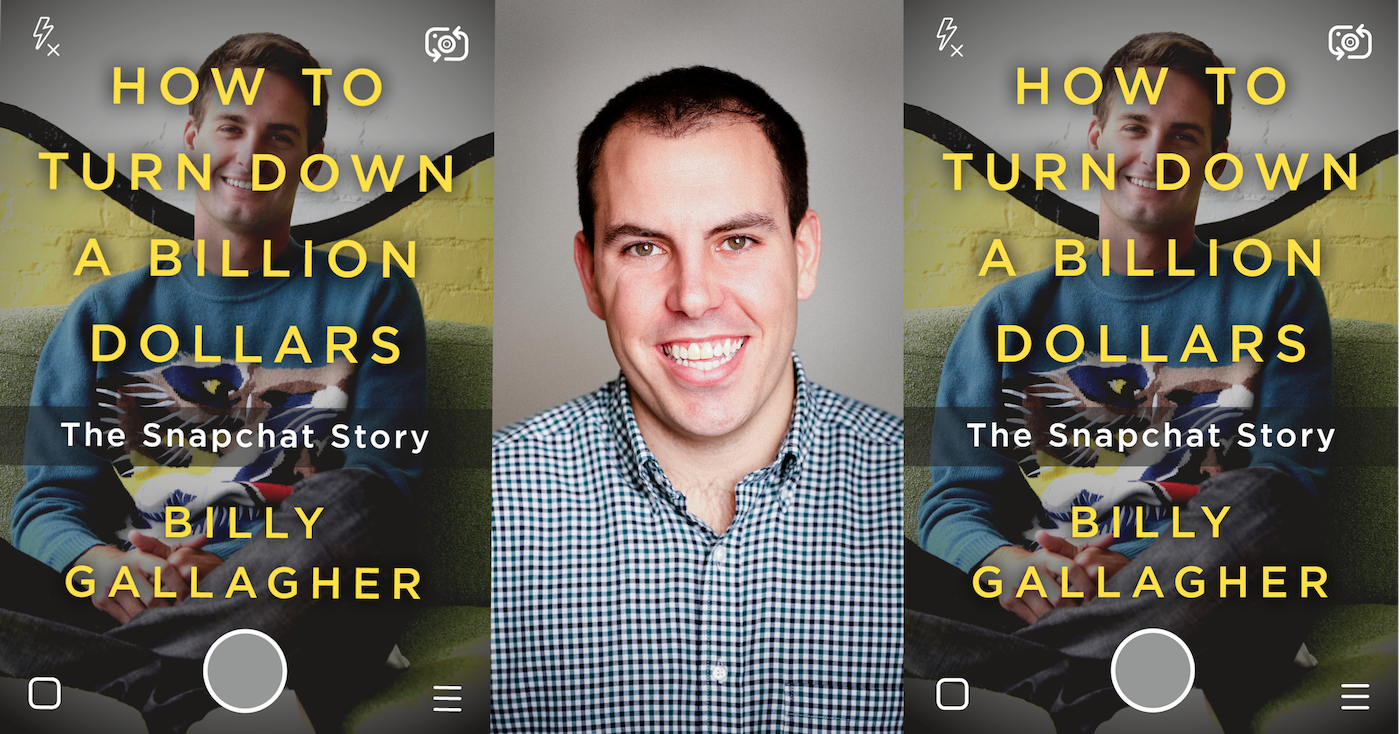Reggie Brown carefully ran his fingers over the blunt, admiring its tightly rolled perfection. It was almost a shame to smoke such a work of art.
He leaned back on the couch in his Kimball Hall dorm room at Stanford University as he discussed the weekend’s social events with two of his former fraternity brothers, David and Zach.
The subject of the conversation moved on to the girls. A dreamy expression appeared on Reggie’s face.
“I wish I could send disappearing photos,” he mused, almost absentmindedly.
David and Zach laughed and agreed that it would be useful if photos disappeared, then turned to who was coming to their party that weekend. Reggie withdrew. He was thinking.
Through the haze of smoke, David and Zach’s chatter faded. Reggie focused on the usefulness of this new idea. A way to send disappearing pictures. He wouldn’t have to worry about sending a hookup a picture of his junk! And girls would be way more likely to send him racy photos if they disappeared.
Suddenly, he jumped up, and rushed down the hall to see if Evan Spiegel was around. Having both recently returned from studying abroad, and with their Kappa Sig lives now over, Evan and Reggie had moved into Kimball Hall, a dorm not far from Donner, where they had lived freshman year. Mulling his disappearing photos idea — how would he best explain it to Evan — Reggie’s topsiders barely touched the worn dark blue carpet as he surged down the hall in a half run/half walk.
Bursting into Evan’s room, Reggie exclaimed, “Dude, I have an awesome idea!” Even before Reggie finished explaining his idea, Evan lit up. He was immediately energized — almost intoxicated. It was just like all those nights of partying together, except they were drinking in Reggie’s idea.
“That’s a million-dollar idea!” Evan finally exclaimed.
Reggie felt relief and validation; more importantly, he felt hope. Even though Future Freshman had failed, Evan hadn’t given up his dream of starting the next transcendent tech company. He was the best operator Reggie knew, capable of taking this stroke of inspiration and making it a reality. And now they had an idea that actually seemed fresh and new. Unique.
The two friends excitedly discussed all of the celebrities whose nude photos had been leaked to the press. Their app would solve this problem! Evan gesticulated quickly and animatedly as he explained to Reggie how he could see people sending disappearing pictures back and forth. Most of us had barely moved past flip phones and BlackBerrys to iPhones at this point. And just as we moved from talking to texting to apps for everything else, people were starting to make the app transition for sex. Tinder would come out a year later, followed by a whole host of copycats. With this early photo-sharing idea, Reggie and Evan imagined a walled garden for couples to share intimate photos.

They would split the company 50/50, vote on everything, and divide equally any losses or gains they might see. Since Evan had more experience from running Future Freshman and other projects, he would be the CEO. Reggie would be the chief marketing officer.
But neither knew how to code well enough to make the app. They would need to recruit one of their friends to join them. They started a list of their fraternity brothers who had taken computer science courses. Most of the seniors that year were still economics majors heading off to Wall Street and the major consulting shops after graduation — it would be a few more years until most sought to make their fortunes in the Valley. But they came up with a couple names and headed off to the fraternity to recruit them.
Evan was a particularly persuasive salesman but he struggled to convince people with the initial pitches. The first two fraternity brothers he invited to join them said no.
Fortunately, Evan was not so easily deterred. And he had the perfect person in mind — his old Future Freshman cofounder, Bobby. Evan was sure he could convince Bobby to work on the app. He called Bobby and explained Reggie’s idea. But Bobby wasn’t convinced. Would people really want to use this? Evan nervously urged him that this idea was different from anything other people were working on. It wasn’t like Future Freshman where they would run into an army of competitors. They had learned a lot from their past two projects, and this was the most unique idea yet. Bobby, at last convinced, agreed to write the code, hoping the third time would be the charm for him and Evan.

Evan, Reggie, and Bobby’s first crack at the idea was dreadful: they created a clunky website where users uploaded a photo then set a timer for when the picture would disappear. They quickly realized it would be much easier and more private for users, and thus more widely used, if they built a mobile app instead of a website; to this day, Snapchat still does not offer a web product.
They sat around in their dorm room, debating how users should interact with their friends and what features would make people tell their friends to download it. Evan ran the group, making sure things were coming together on time and keeping everyone focused, while boisterous Reggie offered up ideas on all the different ways people would use the app. Bobby, much quieter and more reserved than the other two, kept the group grounded and generally agreed with Evan on the app’s direction.
Bobby put in eighteen-hour coding days for the next week to get them to a working prototype. Reggie came up with a name for the app: Picaboo, a riff on the childhood game Peek-a-boo. Evan designed the app’s interface, digitally mocking up what it would look like and how users would interact with it, so that Bobby could turn his visions into reality.
They finished a working prototype of Picaboo just days before final exams. They needed people to download the app, test it out, and hopefully tell their friends about it. Evan decided to approach his former fraternity brothers; despite having been kicked out, he was still friendly with most of the guys from his year, and they were still some of the most social people on campus. Evan needed the popular crowd to use this if it was going to catch on.
Evan quickly typed out a few lines about the app. He had told a lot of the guys about the idea before but not in such a broad, public way. He imagined people forwarding the email, downloading the app, and being instantly addicted. Facebook had launched a mere seven years earlier and ripped through Harvard like wildfire before spreading to other campuses, and then the world. The Stanford Daily wrote at the time about how many students were skipping classes because they were consumed with Facebook. Instagram had been downloaded over forty thousand times on the day of its initial release. Evan used an analytics platform called Flurry to track how many people downloaded the app, how often they used it, and how often they sent pictures to each other. It was time for the world to see Picaboo. Putting the finishing touches on the email, Evan hit send.
And then . . . nothing. It was a dud.
The fraternity brothers who downloaded the app that first week had fun with it, sending each other silly photos of themselves bored in class or pics of themselves partying. Even more so, it was cool because it was one of the first times they could hold something in their palms, on their phones, that one of their friends had built. But it wasn’t serious; it was just Evan’s little toy. A few dozen people had downloaded it and were toying around with it because their friends had created it. But they weren’t totally sure what it was and how they were supposed to use it. It was too early to call Picaboo a failure—the thing had just launched and barely worked. But it was far from the fairy-tale launch Evan had dreamed of.

Evan was enrolled in a mechanical engineering class called “Design and Business Factors” that encouraged upperclassmen product design majors to create a prototype and business plan for an app or other product. The final project, presenting this prototype and business plan, was a third of the grade for the course. Reggie’s idea was much more intriguing than the ones Evan had been considering, so he adopted it for his class. While most of the other students worked in groups of three to five, Evan worked on his idea alone.
At the end of the class, everyone presented their prototypes to a panel of venture capitalists. There are dozens of entrepreneurship classes like this at Stanford, and while there is the allure of a team making it big, the vast majority of the students are just playing startup. If most startups fail, most of these class projects don’t even reach a stage where they can accurately be called a startup.
Like a school science fair, everyone put together a visual presentation to display on tables in the back. Each group sent a presenter to sell the judges on their project and receive feedback. Evan sat in the back of the classroom and watched his peers pitch their ideas. They ran the usual gamut from overpolished presentations by excited students seeking approval to underprepared undergrads just running out the clock until their turn was over. For the first time, Evan worried what other people would think about his app. The fraternity brothers enjoyed playing with it –surely Evan’s peers and these venture capitalists would understand the value of what he had been working so hard to build. They had to, right?
Finally, it was Evan’s turn. Showtime. He approached the front of the room like the entrance to a party, strutting confidently to show the crowd what he, Reggie, and Bobby had been working on tirelessly for the past six weeks. Confident and comfortable, Evan enthusiastically explained to the other thirty students, two professors, and half a dozen venture capitalists that not every photograph is meant to last forever. He passionately argued that people would have fun messaging via pictures.
The response? Less than enthusiastic.
Why would anyone use this app? “This is the dumbest thing ever,” seemed to be the sentiment underlying everyone’s tones. One of the venture capitalists suggested that Evan make the photos permanent and work with Best Buy for photos of inventory. The course’s teaching assistant, horrified, pulled Evan aside and asked him if he’d built a sexting app.

The scene was reminiscent of another Stanford student’s class presentation half a century earlier. In 1962, a student in Stanford’s Graduate School of Business named Phil Knight presented a final paper to his class titled “Can Japanese Sports Shoes Do to German Sports Shoes What Japanese Cameras Did to German Cameras?” Knight’s classmates were so bored by the thesis that they didn’t even ask him a single question. That paper was the driving idea behind a company Knight founded called Nike.
The VCs sitting in Evan’s classroom that day likely passed up at least a billion-dollar investment return. But it’s very easy to look at brilliant ideas with the benefit of hindsight and see that they were destined to succeed. Think about it from their perspective — Picaboo’s pitch was basically, “Send self-destructing photos to your significant other.” Impermanence had a creepy vibe to it, belonging only to government spies and perverts. With the benefit of hindsight, we can see that Facebook developed the conditions that allowed Snapchat to flourish. But it wasn’t at all obvious watching Evan’s pitch in 2011 that this was a natural rebellion against Facebook or that it would grow beyond our small Stanford social circle.
If anyone was searching for the next Facebook killer, they were hopefully looking at a little photo-sharing app called Instagram that had just raised Series A funding valuing the company at $25 million; it’s much more likely that they were looking at any number of apps or websites that have since died without your ever hearing of them.
In spite of this third failure to successfully pitch people on the idea, Evan remained undaunted. And as he hoped to keep Reggie and Bobby engaged and driving on the project, he told them that everyone really liked their idea.
Most of their peers were pursuing internships — or, in Bobby’s case, full-time jobs — at prestigious banks and big tech companies. But Evan and Bobby were used to ignoring the norms to chase their startup ideas. And Reggie was committed to it. Most importantly, they really liked the app. While primitive, it was fun to use. And they really believed that people would want to send pictures that deleted themselves, whether for sexting or otherwise.
The trio agreed to move south for the summer, to Evan’s dad’s house in Pacific Palisades. There, they would develop the app, gain users, and take their shot at becoming the next big Stanford startup. As they agreed on the logistics of the summer, Reggie felt his excitement grow. As long as he had Evan, nothing could go wrong.
—
Come hear more about Snapchat’s early days when TechCrunch’s Josh Constine interviews “How to Turn Down a Billion Dollars” author Billy Gallagher at his book’s release party and signing at San Francisco’s Books Inc. on Monday, February 12th at 7pm.
































Comment